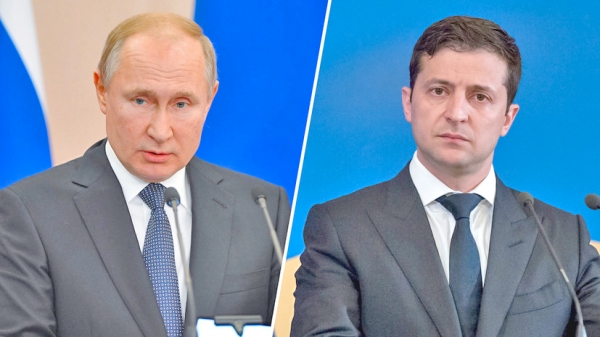
In a TV address on Feb. 24, Vladimir Putin, president of Russia, declared that Russia feels a constant threat from Ukraine. Immediately after the announcement was made, the military headquarters of Ukraine were attacked. Afterward, troops from Russia, Crimea, and Belarus crossed the border of Ukraine. Putin banned the terms of “war” or “invasion” in Russian articles and broadcasts, insisting the attack is a “special military operation”. According to Putin, the attack was for the “demilitarization and de-Nazification” of Ukraine and for protecting Russians from genocide in Ukraine. However, Volodymyr Zelensky, president of Ukraine, refuted Putin’s allegations, emphasizing the fact that he is Jewish and Ukraine is a vibrant democratic society.
After the dissolution of the Soviet Union (USSR) in 1991, Ukraine was formally recognized as an independent country. As time passed, some Eastern Bloc countries joined the North Atlantic Treaty Organization (NATO), an intergovernmental military alliance among the North Atlantic countries. NATO is bound by collective security, in which its independent member states agree to mutual defense in response to an attack by any external party. Putin demanded that NATO provide legal guarantees that it would stop expanding east, where countries such as Ukraine and Georgia are located. However, NATO rejected this condition, on which some experts analyze that Russia felt threatened and attacked Ukraine.
The war has caused numerous refugees. According to the UNHCR, the population of Ukrainian refugees reached 3.5 million. Neighboring countries of Ukraine are actively absorbing refugees. According to the UN, Poland absorbed 1.91 million refugees, followed by Hungary (214,160), Slovakia (165,199), Romania (491,409), Moldova (350,886)and other European countries.
Countries around the world are showing various responses to the war. Countries supporting Ukraine argue that disputes should be resolved through negotiations, not through violence. The U.S. provided two billion USD worth of military supplies to Ukraine. For the first time in its history, the European Union is financing the purchase and delivery of arms worth 502 million USD to Ukraine. The U.K. decided to offer Ukraine military support, such as non-lethal aids and defensive weapons. Canada and European countries supplied Ukraine with weapons and funds. South Korea also sent Ukraine medical supplies worth 10 million USD. However, Xi Jinping, president of China, declared that China “respects each country’s sovereignty and territorial preservation”, expressing its view that Russia is “making a reasonable demand for its security.” India decided to remain neutral, but declared that it will “contribute in any manner for peace.”
Technology is being used to aid Ukraine. Elon Musk, CEO of SpaceX, activated SpaceX’s Starlink satellite internet service in Ukraine to remediate the disruption of internet access. MDA, a Canadian aerospace company, is helping Ukraine by collecting satellite images of restricted areas in Ukraine by using synthetic aperture radars (SAR), a unique radar that can see through any weather and cloud conditions. In return, Russia is financially restricting other countries that are helping Ukraine. Russia declared it will ban exports of specific products and raw materials until the end of 2022. Since many countries were importing oil and natural gas from Russia, the war may result in a global financial crisis.
Russia is facing financial isolation from the world. The Society for Worldwide Interbank Financial Telecommunication (SWIFT), a global financial artery that allows the transfer of money across borders, agreed to block Russian banks from its network. Losing access to SWIFT will make it hard for Russian companies and individuals to import, export, borrow or make investments overseas. Standard & Poor (S&P) graded Russia’s credit level as CC, which is a level right before default. Moody’s and Fitch also degraded Russia’s credit level as “junk”. Russia succeeded in paying off its government bonds on March 16. However, the financial industry is paying sharp attention since Russia has two billion USD worth of government bonds to pay in April.
Experts are expecting the war to be prolonged, and are warning the world to keep track of the ongoing war and its fallouts.


